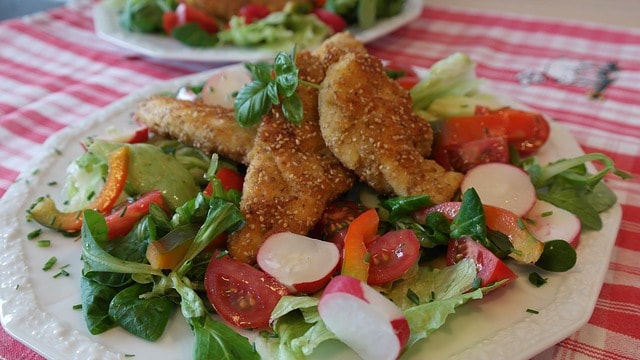Chicken salad is praised for being one of the healthiest and nutritious meals known to man. It is low in calories yet high in protein, vitamins, and other minerals.
Whether you are losing weight, looking for a quick snack, or just love it, a chicken salad will make your dream come true.
The question is: is it really safe for your doggie?
Not every meal meant for human consumption is necessarily safe for our furry friends. Things like unripe tomatoes, garlic, chocolate, and myriad garden plants are okay for us but toxic to dogs.
Is chicken salad on the list?
We investigate…
How Is Chicken Salad Prepared?
To know whether chicken salad is safe for dogs or not, we have to know what goes into making it.
In all honesty, there are tens of chicken salad recipes for dogs. Both homemade and commercial options include different ingredients in their salads.
However, the basic chicken salad made for dogs contains pieces of cooked chicken, bell peppers, celery, and carrot.
On the other hand, dressing has ingredients such as avocado, lemon juice, cilantro, vegetable oil, yogurt, garlic powder, salt, and pepper.
Other versions may have mayonnaise and seasonings for the dressing and cheese or onions for the actual salad.
Is It Safe For Dogs?
Chicken salad is one of those things that can be safe or unsafe for a dog depending on what is put in there.
For instance, if it has nothing but diced chicken pieces, celery, bell peppers, and olive oil, it is safe for your dog.
All of the ingredients are dog-friendly and actually beneficial for the dog.
Chicken is a fantastic protein for her while vegetables and oil act as vitamins and fats respectively.
Toxic Ingredients Contained In Chicken Salads

On the other hand, chicken salad with things like onions, garlic, avocado, mayonnaise, and seasonings should not be fed to any dog whatsoever.
Here’s why.
1. Onions
If you have been a dog parent for a while now, you are probably aware that onions are a no-no to your furry friend.
According to the American Kennel Club (AKC), the spice contains a toxic substance called N-propyl disulfide.
When consumed, it will fasten itself to the oxygen molecules located in your pooch’s red blood cells. This compromises their ability to transfer oxygen and tricks the body of the dog into thinking that the blood cells are actually invaders.
As a result, the body will destroy the red blood cells triggering hemolytic anemia.
Every part of the onion plant is toxic to your pooch. This includes the juice, flesh, leaves, and onion powders.
Additionally, it doesn’t matter if the onion is raw, cooked, or processed—it remains to be toxic to dogs.
Commercial chicken salads may add powdered onion to their recipes. Before you buy a can for your dog, check the list of ingredients.
Similarly, homemade chicken salads with onions should not be given to your dog.
2. Garlic
Garlic and onions are in the same allium family.
As Pet Poison Helpline would have it, garlic is approximately five times more potent than leeks and onions.
It causes damage to the red blood cells ultimately triggering anemia.
Some of the common symptoms of garlic poisoning include GI upset (nausea, vomiting, diarrhea, drooling, and pain in the abdomen), pale gums, lethargy, increased heart rate, and collapse.
Your dog can get away with trace amounts of garlic in his salad but large amounts can cause toxicity.
Since it can be difficult to tell the line between the two, don’t offer food with garlic at all.
3. Avocado
Avocadoes are a source of healthy fats, making them a staple addition in many chicken salads.
Sadly, this is one fruit that your dogs shouldn’t swallow at any point in time.
See, avocadoes contain a toxic profile referred to as persin. Simply put, this is an antifungal compound contained in the seeds, leaves, and fruit of the avocado plant. Ingestion of copious amounts of persin may turn the fruit into a toxin.
In addition, the avocado pit is not well-digested by dogs. In case your doggie swallows it, it may cause blockages and warrant a surgical operation.
Lastly, the avocado pulp can also cause an inflammation of the pancreas, a condition called pancreatitis. This can happen if the doggie eats small amounts of avocado pulp.
In short, it is best to avoid giving a dog chicken salad with avocado dressing in it.
4. Mayonnaise
Mayo is not toxic to dogs per se but it is extremely fatty.
Unless you want your dog to gain weight, she is better off with other healthy salad dressings.
Too much mayo may lead to obesity in dogs.
Related Posts:
5. Saturated Fat
Chicken salad also contains a lot of saturated fat. According to Fat Secret, 1 cup of Chicken salad has about 32 grams of fat. This is a lot of fat as far as the health of your pup is concerned!
Dogs should never be exposed to a lot of fats because it causes a wide range of health conditions including cardiovascular diseases, pancreatitis, and weight gain.
If this study published in Harvard Health Publication is anything to go by, saturated fats can also increase the amount of bad cholesterol in your dog, triggering inflammations.
Related: Can Dogs Eat Scrapple?
6. Seasonings
Lastly, certain seasonings found in chicken salads may be harmful to dogs as well. This is especially true for commercial ones.
Not only are they full of salt but they contain fillers, preservatives, and flavorings.
While your pup can get by with a little seasoning occasionally, a lot of it may trigger stomach upsets.
Why put your dog through that when she doesn’t even appreciate the taste of seasonings anyway?
Closing Thoughts
We, humans, find chicken salad healthy, savory, and versatile.
You can play with a plethora of ingredients while keeping your food as healthy as can be.
Unfortunately, some of the favorite salad recipes may hurt your dog.
If you must feed her chicken salad keep things simple with chicken, vegetables, yogurt, other meats, and oil.
Else, adding other toxic ingredients will cause problems for her.
Related Posts:
As an Amazon Associate, we may receive a small commission from qualifying purchases but at no extra cost to you. Learn more. Amazon and the Amazon logo are trademarks of Amazon.com, Inc, or its affiliates.

